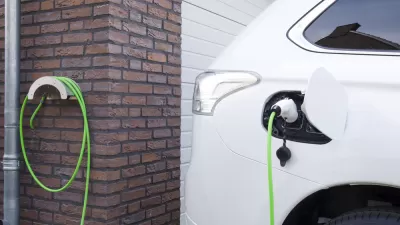All-electric vehicles - those without tailpipes or gas tanks, are entering the marketplace, particularly in California, but unlike other models from the same manufacturers, they are not expected to sell well. So why are they even being manufactured?
Chris Woodyard explains why you may have seen (if you have a keen eye) a flurry of new electric vehicle (EV) models such as the Ford Focus Electric, Chevrolet Spark EV, Fiat 500E, Toyota's RAV4 EV or Scion iQ EV, or the Honda FIT EV on the roads or in the parking lots of California lately.
Most are being produced primarily or solely to meet California's mandate that large automakers sell a percentage of zero-emission cars in order to sell traditional cars in the state.
In other words, for auto manufacturers that sell at least 60,000 vehicles a year in California (of which there are currently six) to continue to sell the vehicles that are profitable, particularly the SUVs, pick-ups, and luxury sedans, they must not only produce a zero-emission-vehicle (ZEV) - they must sell them as well. Consequently, manufacturers lose in two ways:
- They must produce a vehicle that "are selling by the hundreds in an industry where tens of thousands determine profitability".
- They must lower their price in order to make it marketable. As a result, they lose thousands of dollars on each EV sale
Last month, Chrysler Group CEO Sergio Marchionne said his company would limit production of the electric Fiat 500e because it will lose $10,000 on each. "Doing that on a large scale would be masochism to the extreme," he said.
For those reasons, they've acquired the name "compliance cars", although Woodyard warns not to call them by that term because "automakers are proud of their new electric fleet".
The compliance cars stand in contrast to the electric Nissan Leaf (now outselling the Chevy Volt) or Tesla Model S (see related article on Tesla enjoying its first profitable quarter) which are being promoted nationwide with the goal of commercial success.
According to Analisa Bevan, sustainable-technology chief for California's Air Resources Board, "10 other states also will adopt California's zero-emission mandate", so opting out of the ZEV mandate is realistically not an option for the carmakers. In fact, they may even become part of the 2025 federal requirements.
California estimates that by then, 15.4% of vehicles on its roads will be zero-emission.
If their prediction proves correct, has the Air Resources Board considered what the effect will be on transportation funding, e.g. how to pay to maintain the roads that the EVs will drive on along with other vehicles that do pay fuel taxes?
Taking a different course than California which provides a $2,500 credit for eligible EVs, Virginia charges a special $64 annual registration fee on them and hybrid vehicles while Washington State added a $100 EV-only registration fee in February to ensure they contribute to road funding since they pay little or no gas taxes.
FULL STORY: Automakers hawk electric 'compliance cars' to meet rules

Maui's Vacation Rental Debate Turns Ugly
Verbal attacks, misinformation campaigns and fistfights plague a high-stakes debate to convert thousands of vacation rentals into long-term housing.

Planetizen Federal Action Tracker
A weekly monitor of how Trump’s orders and actions are impacting planners and planning in America.

Chicago’s Ghost Rails
Just beneath the surface of the modern city lie the remnants of its expansive early 20th-century streetcar system.

Bend, Oregon Zoning Reforms Prioritize Small-Scale Housing
The city altered its zoning code to allow multi-family housing and eliminated parking mandates citywide.

Amtrak Cutting Jobs, Funding to High-Speed Rail
The agency plans to cut 10 percent of its workforce and has confirmed it will not fund new high-speed rail projects.

LA Denies Basic Services to Unhoused Residents
The city has repeatedly failed to respond to requests for trash pickup at encampment sites, and eliminated a program that provided mobile showers and toilets.
Urban Design for Planners 1: Software Tools
This six-course series explores essential urban design concepts using open source software and equips planners with the tools they need to participate fully in the urban design process.
Planning for Universal Design
Learn the tools for implementing Universal Design in planning regulations.
planning NEXT
Appalachian Highlands Housing Partners
Mpact (founded as Rail~Volution)
City of Camden Redevelopment Agency
City of Astoria
City of Portland
City of Laramie



























